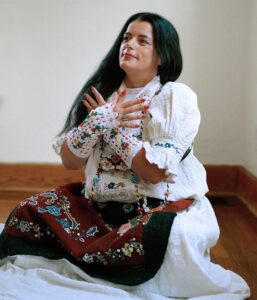Based on the updated data of the Ministry for Information Society and Administration, in accordance with the Law on employees in the public sector in state institutions, Albanians must be represented in the administration by 30 percent in accordance with the registration data carried out in October last year.
According to the data of the State Statistics Agency on March 30, the total number of resident and non-resident population in North Macedonia is 2,097,319, of which 54.21 percent are declared Macedonian, 29.52 percent Albanian, 3.98 percent Turkish, 2.34 percent percent from the Roma community, 1.18 percent Serbs, 0.98 Bosniaks and 0.44 Vlachs.
Meanwhile, as a resident population without including Macedonian citizens living in the diaspora, North Macedonia has only 1,836,713 inhabitants, of which 58.44 percent are Macedonian and 24.3 percent are Albanian.
The Director of the State Statistics Entity, Apostoll Simonovski, said that he has already informed the Ministry of Information Society and Administration that only the part of the population that is registered as resident in Macedonia remains as a relevant category for the representation of ethnic communities in state institutions. of the North.
The Minister of Information Society, Admirim Aliti, says for Radio Free Europe that the Law on employees in the public sector, where it is incorporated and the issue of representation of different ethnicities in state institutions, clearly defines that the total number of citizens is taken as a basis registered, without making the distinction between resident and non-resident.
“What we have to do, as the Minister, is to respect the law. In the law, “citizens” are emphasized, no distinction is made between resident or non-resident. Even in the preliminary database based on the data of the population census in 2002, both resident and non-resident citizens are included. We did the same thing now. But, various Macedonian circles want to make problems out of this. The Director of the Statistics Entity refers to some UN standards that give priority to the resident population, but does not refer to the Constitution. And, in any case, we prioritize respecting the country’s Constitution before respecting the standards of international organizations”, says Aliti.
What does the law say?
The law on employees in the public sector, which began to be implemented in 2015, provides a mechanism for the distribution of new employment with adequate and fair representation of representatives of different ethnic communities living in North Macedonia.
With the latest data update from the Information Society department, the distribution of new employment is done electronically through the mechanism called ‘balancing’.
The balancer as a mechanism began to be implemented in 2016, this methodology for employment planning in the public sector. Based on this methodology, each institution is obliged to draw up the annual employment plan and implement employment procedures in accordance with the annual plan, respecting the fair and adequate representation of all ethnic communities living in North Macedonia.
The latest version of the balancer with updated data from the last population census that was carried out in October last year has been implemented since August this year.
While experts are divided whether it should be ethnicity or their professional training that opens doors for new administration workers.
Dragan Gocevski, lecturer of Administrative Law at the “St. Cyril and Methodius” University in Skopje, tells Radio Free Europe that the inclusion of Albanians in institutions in accordance with the results of the census was unsuccessful, in terms of the functioning of the administration .
Gocevski considers that if the balancer should be respected, then only the percentage of the resident population should be taken as a basis.
“The data from the last census will have to be used and most importantly, the attitude of the relevant bodies should be taken into account, in this case the State Statistics Agency, this institution which has made it known that only the data of the resident population should be taken into account “, says Gocevski.
Isak Sherifi, professor at the University of Tetova, former political prisoner, does not agree with this position.
“As long as the Albanian diaspora is present in the homeland through remittances and investments, the homeland should be served by an administration that is in line with the percentage of the general population, including the people living in the diaspora,” assesses Sherif.
On the other hand, Gocevski adds that the balancer has managed to only partially produce the expected effects, namely to open the doors to different ethnic communities in a barbaric form in accordance with the population census data.
“The balancer as a mechanism proved unsuccessful, as the desired effects were achieved partially. Why do I say this? During employment, no one can be told how they feel, which ethnic community they belong to. Accordingly, he abuses the jobs guaranteed for certain ethnic communities, since he still says he feels he belongs to a certain ethnic group, depending on who that job is guaranteed for, says Gocevski.
However, Sherif estimates that many institutions, even after two decades from the signing of the Ohrid Agreement, avoid the representation of Albanians in accordance with the general composition of the population.
“Without the mechanisms that the Ohrid Agreement produced for the fair and adequate representation of all ethnicities in North Macedonia, the Albanians in the state administration would remain represented in a provisional manner”, emphasizes Sherif.
On the other hand, Neda Malevska from the Center for Change Management, says for Radio Free Europe that the mechanism of fair and adequate representation based on ethnicity in state institutions should be completely removed, and instead a measure for the efficiency of performing tasks by administrators.
“I estimate that the approach of Minister Admirim Aliti, who in updating the data included the non-resident population, is inadequate because that percentage does not live here and as such should not be included as a percentage that should be represented in institutions”. says Maleska.
The Macedonian opposition party, VMRO DPMNE, estimates that the balancer mechanism should be removed as it has a negative impact in terms of the quality and professionalism of employees in the administration.
According to the data from the register of employees in the public sector until December 2021, in a total of 1 thousand 346 institutions of central and local government, there are 132 thousand 88 administrators employed. Of this number, 82 thousand 975 are Macedonians, 22 thousand 954 Albanians, 2 thousand 203 Turks, 1 thousand 34 Roma, etc., which essentially means that Albanians in state institutions are represented by about 20 percent./REL








